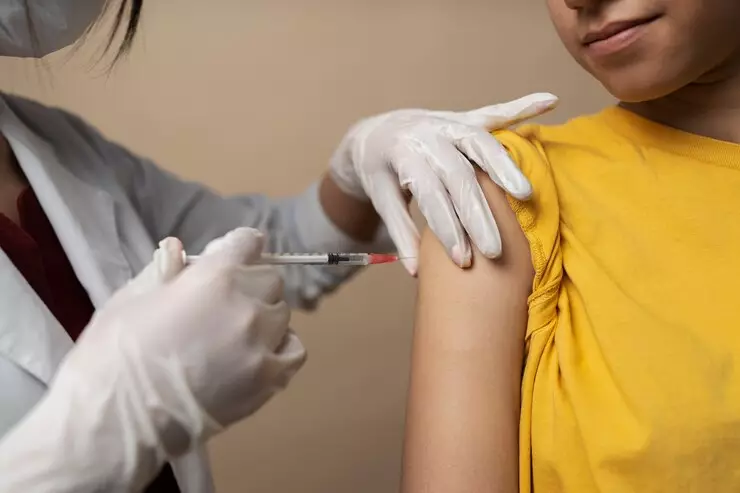foto: freepik.com
Brilio.net - Herpes zoster is a disease caused by a virus called varicella zoster. This disease is a reactivation and manifestation of varicella ( chicken pox ). The course of this disease begins with exposure to the varicella zoster virus. Next, the sufferer will experience chicken pox. If it has been successfully cured, the virus does not die and disappears from the human body. However, the virus will be dormant or latent, especially in neuronal cells and one day the virus can experience reactivation and then manifest as shingles.
In general, shingles begins with initial symptoms or prodromes that are quite varied. Symptoms include fever with varying temperatures, feeling weak or lethargic and in shingles accompanied by discomfort, soreness, pain in the area which will later experience a skin eruption.
One way to prevent the varicella zoster virus is with the shingles vaccine. The zoster vaccine is the only protection against herpes zoster (shingles) and its complications. In individuals who have a history of previous shingles infection, the zoster vaccine can help prevent the disease from recurring in the future. Chickenpox and shingles are closely related because they are caused by the same virus (varicella zoster virus).
Quoting fromimmuni.id, it is stated that the zoster vaccine is 90 percent more effective in preventing herpes zoster and its complications in adults aged 50 years and over who have a healthy immune system. Immunity persists for at least the first 7 years after vaccination. In adults with weakened immune systems, the zoster vaccine is 68-91 percent effective in preventing shingles, depending on the condition affecting the immune system.
From the explanation above, it can be concluded that the shingles vaccine is a solution for shingles. However, you need to know more about the advantages and side effects of the vaccine as well as how to deal with the side effects of the shingles vaccine. For this reason, brilio.net has summarized complete information from various sources, Thursday (25/7).
Advantages of the shingles vaccine.

photo: freepik.com
The advantages of the herpes vaccine are very significant for the human body . The advantages of the shingles vaccine are as follows:
1. Prevention of shingles.
This vaccine is very effective in preventing shingles (herpes zoster) which is caused by reactivation of the varicella-zoster virus, the same virus that causes chickenpox.
2. Reduces the risk of post-herpetic neuralgia (PHN).
Post-herpetic neuralgia is a painful complication of shingles that can last long after the shingles rash has healed. Vaccines can significantly reduce the risk of PHN.
3. Reduces the severity of the disease.
For those who still get shingles despite vaccination, the shingles vaccine can reduce the severity of the disease and the duration of symptoms.
4. Improve quality of life
By preventing shingles and its complications, this vaccine helps improve quality of life, especially for older people who are more susceptible to serious complications from shingles.
Side effects of the shingles vaccine.

photo: freepik.com
In general, the shingles vaccine can provide protection against shingles. However, side effects after shingles vaccination occur within 2-3 days. In addition, severe reactions such as Guillain-Barr Syndrome (GBS) and serious nervous system disorders can occur, but are very rarely seen and reported.
How to deal with the side effects of the shingles vaccine.

photo: freepik.com
Addressing the side effects of the shingles vaccine is important to ensure comfort and health after vaccination. Although generally mild and temporary, side effects such as pain at the injection site, mild fever, headache, fatigue, or muscle aches can interfere with daily activities. The ways to deal with side effects are as follows:
1. Pain, redness, or swelling at the injection site.
- Cold compresses on the injection area can help reduce swelling and pain.
- Avoid rubbing or pressing the injection area.
- Pain relievers such as ibuprofen or acetaminophen can help with pain and inflammation.
2. Mild fever.
- Drink plenty of fluids to stay hydrated.
- Enough rest.
- Fever reducers such as ibuprofen or acetaminophen can help reduce fever.
3. Headache.
- Drink plenty of water to avoid dehydration which can make headaches worse.
- Rest in a quiet, dark place.
- Headache relievers such as ibuprofen or acetaminophen can be used.
4. Fatigue or muscle pain.
- Get enough rest and avoid heavy physical activity.
- A light massage or warm bath can help relieve muscle pain.
5. Nausea.
- Eat light foods and avoid heavy or fatty foods.
- Drink water or herbal tea in small amounts but often.
6. Allergic reactions (rare, but serious).
- If you experience symptoms of an allergic reaction such as rash, itching, shortness of breath, or swelling of the face, lips, or throat, seek emergency medical help immediately.
- Antihistamines may be needed to treat mild allergic reactions.
(brl/jad)